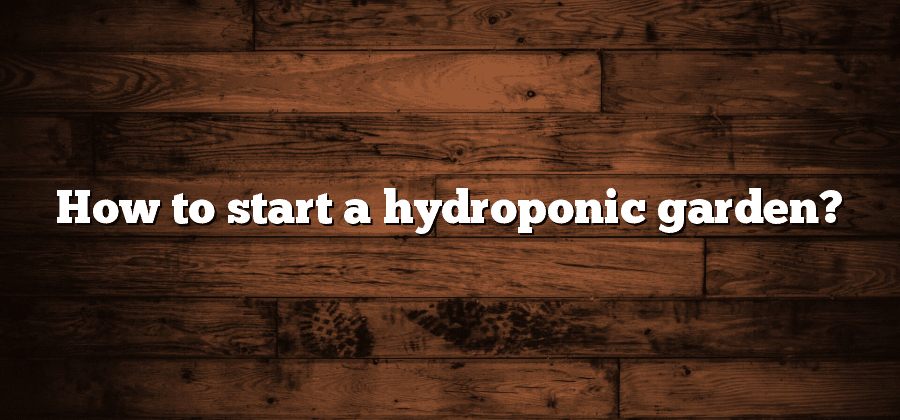Choosing the Right Location
Finding the perfect location is a critical factor in successful hydroponic gardening. The location you choose will greatly impact the overall performance and productivity of your system. When selecting a location, it is important to consider several factors such as access to sunlight, availability of space, and proximity to water sources.
First and foremost, adequate sunlight is essential for the growth and development of your plants. Most crops require at least 6-8 hours of direct sunlight per day. Therefore, choose a location where your hydroponic system will receive maximum exposure to natural light. If you have limited access to sunlight, you may need to invest in artificial lighting to supplement the growth of your plants. Additionally, ensure that the location is free from obstructions such as tall buildings or trees that may cast shadows and hinder the amount of sunlight your plants receive.
Selecting the Ideal Hydroponic System
When it comes to choosing the ideal hydroponic system for your needs, several factors need to be considered. Firstly, consider the space you have available for your hydroponic setup. If you have limited space, a vertical hydroponic system might be the best option for you, as it allows you to maximize your growing area in a vertical direction. This type of system is particularly useful for those growing in small apartments or urban settings.
Secondly, think about the type of plants you want to grow. Different plants have different needs when it comes to hydroponic systems. For example, if you want to grow large plants with deep root systems, a deep water culture system might be the most suitable choice. On the other hand, if you are planning to grow smaller plants or herbs, an aeroponic system could be a better fit. Consider the specific requirements of the plants you want to grow to ensure the system you choose supports their growth and development.
Investing in a high-quality hydroponic system is crucial for success in your indoor gardening endeavors. Make sure to do thorough research, read reviews, and compare different options before making a decision. The system you choose should not only be durable and reliable but also provide the necessary features and functionality to meet your specific needs. Don’t hesitate to consult with experts or experienced hydroponic growers to get their recommendations and insights. Taking the time to select the ideal hydroponic system will set you on the path to a successful and satisfying indoor gardening experience.
Understanding Nutrient Solution
A crucial aspect of successful hydroponic gardening is understanding the role of nutrient solutions. Nutrient solutions serve as the primary source of essential elements and minerals that plants need to thrive. Unlike traditional soil-based gardening, hydroponic systems rely on these solutions to directly deliver the necessary nutrients to the plant roots.
To ensure optimal growth and development, it is important to strike the right balance when preparing the nutrient solution. This involves understanding the specific nutrient requirements of the plants you are cultivating and carefully measuring and adjusting the concentration of each element accordingly. The composition of the nutrient solution may vary depending on factors such as the plant species, growth stage, and environmental conditions. It is vital to regularly monitor and adjust the nutrient levels to avoid deficiencies or toxicities that can hinder plant growth. By mastering the art of creating and maintaining a well-balanced nutrient solution, you can provide your hydroponic plants with the precise nutrients they need to thrive and yield a bountiful harvest.
Purchasing High-Quality Seeds or Seedlings
When it comes to embarking on a successful hydroponic gardening journey, one of the crucial factors to consider is the quality of the seeds or seedlings that you purchase. High-quality seeds or healthy seedlings can make all the difference in the growth and development of your plants. Selecting the right source and ensuring that you are getting top-notch genetics will set a strong foundation for a thriving hydroponic garden.
Before purchasing seeds or seedlings, it is essential to do thorough research and identify reputable suppliers or nurseries. Look for suppliers with a track record of providing quality products and reliable customer service. Reading reviews and seeking recommendations from fellow hydroponic enthusiasts can also help you make an informed decision. Additionally, consider the specific requirements of the plants you intend to grow and choose a supplier that specializes in those varieties. By investing in high-quality seeds or seedlings, you increase the chances of achieving healthy, vigorous plants that will yield abundant harvests in your hydroponic system.
Providing Adequate Lighting
Proper lighting is crucial for the success of any hydroponic system. When it comes to providing adequate lighting, there are a few key factors to consider. Firstly, it is essential to understand the specific light requirements of the chosen plant species. Different plants have varying needs for light intensity and duration, so it is crucial to do thorough research or consult with experts to determine the optimal lighting conditions.
One option is to use artificial lighting sources such as LED or fluorescent lights. LED lights are highly recommended due to their energy efficiency and the ability to produce a targeted spectrum of light. They can be easily adjusted to provide the appropriate light intensity and color needed for healthy plant growth. On the other hand, fluorescent lights are cost-effective and widely available, making them a popular choice for smaller-scale hydroponic setups. Whichever lighting option is chosen, it is important to ensure the lights are positioned at the correct distance from the plants to prevent burning or stunting their growth. Regular monitoring of light levels and adjustments as needed will ensure that your hydroponic plants receive the optimal amount of light for photosynthesis and overall development.






